Khoury News
Meet the 2025 Khoury College award winners
This commencement season, Khoury College recognized ten students for exceptional achievement in research, teaching, community service, and co-op work.
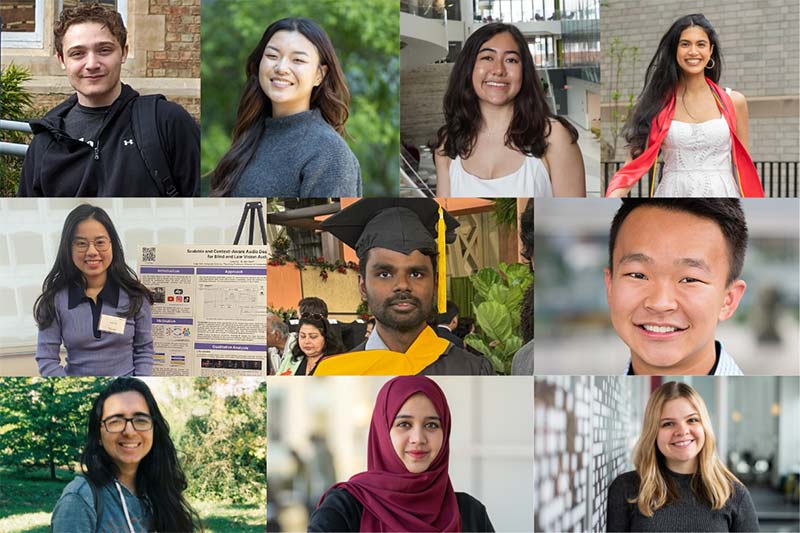
Each year, Khoury College honors exceptional students for achievement in research, teaching, community service, and co-ops. To learn more about this year’s winners, click any of the links below, or simply read on.
- Jake Ginesin, Undergraduate Research
- Katelin Tharp, Undergraduate Teaching
- Heidi Eren, Undergraduate Community Service
- Shreya Thalvayapati, Undergraduate Co-op
- Lana Do, Graduate Research
- Kishore Sampath, Graduate Teaching
- Yi Zu, Graduate Community Service
- Neha Makhija, PhD Research
- Uzma Haque Syeda, PhD Teaching
- Lisa Oakley, PhD Community Service
Jake Ginesin, Undergraduate Research Award
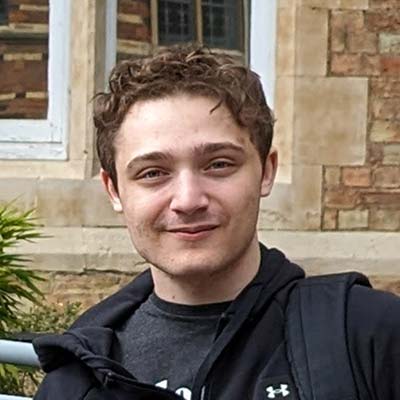
Before he entered Northeastern University, Jake Ginesin had little experience with programming and mathematics. Four years later, he’s graduating with a double major in computer science and mathematics and preparing to begin his PhD in computer science at Carnegie Mellon University.
Ginesin started as an engineering major, spending his first semester at University College Dublin as part of the NUin program. While in Ireland, he began poring over computer science research during his free time. By the time he made it to Boston, his mind was set. He switched his major to computer science and reached out to Khoury professor Cristina Nita-Rotaru to start researching.
Under Nita-Rotaru, Ginesin’s initial research focused on automated reasoning for simple mathematical statements and graphing problems. After he returned from a summer NSF research experience at the University of Southern California studying and measuring critical internet infrastructure, he officially joined Nita-Rotaru as a research assistant to study cybersecurity and distributed protocols.
From there, research opportunities began streaming in. Over the next three years, Ginesin continued his research as a co-op at the University of Oxford, as an intern learning automated bug finding techniques at Harvard University, and as a research assistant studying computer architecture at Northeastern’s College of Engineering, all while maintaining his position with Nita-Rotaru. He’s contributed to four published papers and won the 2025 Internet Research Task Force Applied Networking Research Prize for his paper analyzing the security of the Stream Control Transmission Protocol, a standard communication protocol in telecommunications and internet infrastructure.
“We used automated tools to discover problems in the original protocol specification and proposed solutions to the standardization of this protocol,” he explained. “We did a bunch of impactful work there.”
Starting this fall, Ginesin will put his extensive research chops to use as he pursues a security-focused computer science doctorate.
“Modern society has all this computing infrastructure and computer systems that we rely on for pretty much everything,” he said. “The least we can do is ensure that it’s reliable and secure.”
Katelin Tharp, Undergraduate Teaching Award
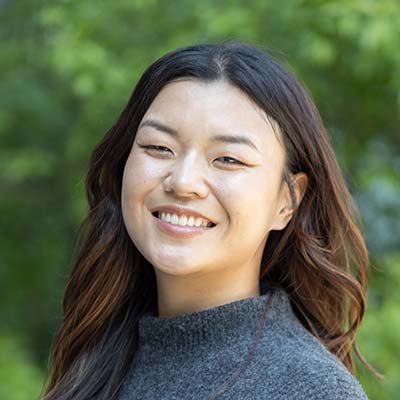
Katelin Tharp didn’t always want to become a teacher, but she always loved teaching. As far back as eighth grade, she volunteered to teach basic Mandarin classes after school, and in high school she became a peer tutor.
Computer science, on the other hand, wasn’t Tharp’s childhood passion. Her favorite subject in high school was English, and she declared a computer science and cognitive psychology combined major as a practical career choice. But as she adjusted to the demands of a new discipline, she realized that her relative inexperience uniquely prepared her to lend a hand to students in the same boat.
Tharp worked as a Khoury College TA for three years and completed a co-op at Northeastern’s London campus as a lead TA — teaching computer science labs, creating assignments, holding office hours, and leading a team of remote Boston TAs.
“I thought if I could succeed in computer science without any previous experience, I could help other people understand it,” she said. “I found a way to reconcile this thing that I was doing pragmatically with something that I’m super passionate about, which is teaching. Teaching helped me love computer science, and vice versa.”
Since graduating in December, Tharp has returned to one of her co-ops as a full-time software engineer. This summer, she plans to move back to her home state of California to pursue a master’s in education at UC Berkeley. She will be earning her teaching credential in English, but she'd also be happy to apply her computer science and psychology skills by teaching electives.
“If it wasn’t for all the teaching opportunities I got in my undergrad, all that experience engaging with content and teaching students and being on the ground full-time as a teacher, I probably wouldn’t have gotten this opportunity or learned that I love teaching so much,” she said.
Heidi Eren, Undergraduate Community Service Award
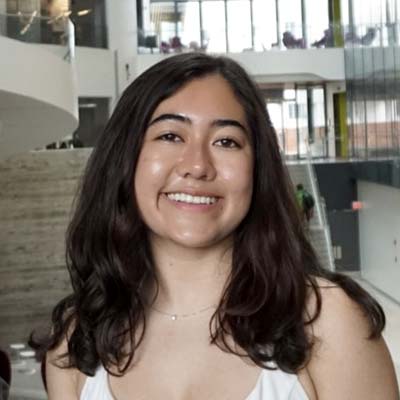
Growing up, Heidi Eren had no exposure to coding or computer science. She took a data science class her freshman year at Khoury College to challenge herself and tried out a few different majors until she finally landed on biochemistry and data science.
Eren found that studying data science was a steep learning curve. She became a regular at office hours, asked for help from professors and TAs, and dealt with her fair share of impostor syndrome. When she took a class taught by Laney Strange, a teaching professor and director of broadening participation at Khoury College, she realized her hard work gave her an avenue to connect with the greater Boston community.
Strange leads Women’s Community of Code (WCoC), a program that hosts beginner-friendly coding workshops for women and girls on Northeastern’s campus. Eren learned about the group from Strange’s class and started volunteering in the fall of 2022. Ever since, she’s spent her Saturdays teaching everyone from second graders to 50-year-olds to code simple websites and games with HTML, JavaScript, and Python.
“It’s definitely easier to teach once you know what it was like on the other end,” she said. “I never had this kind of exposure when I was younger, so it is important to me to help young girls feel more confident in a field that’s often dominated by men.”
After graduation, Eren will relocate to New York City to pursue a master’s degree in biomedical engineering at Columbia University. Although she’s planning to pivot from data science to systems engineering for medical devices, she’s also excited to maintain her commitment to inclusive computer science education. Her favorite part of volunteering with WCoC was getting to know the children personally, and she’s already found a New York-based organization that offers tutoring and workshops in elementary and middle schools.
“Whenever someone ran a code successfully, it felt as if there was a lightbulb that lit up in their eyes. It was great to be able to see that kind of impact,” Eren said. “I want to bring that impact to New York City.”
Shreya Thalvayapati, Undergraduate Co-op Award
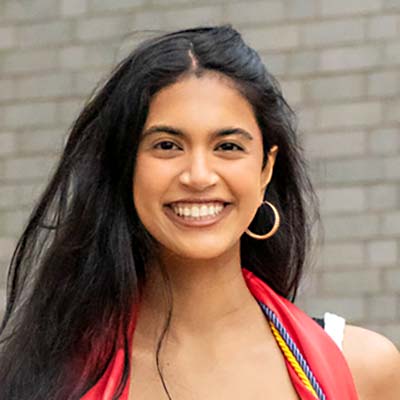
As she enters the job market, Shreya Thalvayapati has made herself a promise: if she goes a year in corporate life without seeing the human impact of her work, she’ll pivot.
Luckily, Thalvayapati, a data science and economics combined major, has plenty of experience throwing her data science skills behind social causes she believes in. At her first co-op, which she self-designed after cold emailing several organizations and startups that aligned with her principles, she wore multiple hats as a data science intern at a renewable energy company called muGrid Analytics. In addition to building predictive models that calculated the most active energy usage periods during the day, she also represented the company at industry networking events and conducted strategy-informing competitor analysis.
For her second role, Thalvayapati secured a position at Northeastern’s Burnes Center for Social Change as an AI4Impact co-op, where she aided in the research and development of an AI tool for reducing inequities in Massachusetts’ federal grant application system. She explained that some towns have more resources to hire professional grant writers than others, which can widen funding gaps between Massachusetts’ richest and poorest communities. To address this, Thalvayapati and fellow co-ops worked on Grantwell, a computing tool that streamlines the grant application process by simplifying funding language and drafting required documents.
“If and when the product gets fully deployed, I think it will make a big impact on these communities,” she said. “These federal grants can be up to $10 million, and that money can go towards things like education and public health.”
In both roles, Thalvayapati felt grateful for the chance to work “at the intersection of technology and social change,” a value she aims to keep pursuing after graduation.
“My time at Burnes was definitely where my passion for tech and social science cemented,” she reflected. “Every day was different, and I felt like I was actually making a difference. That was such a big draw for me, because I want to see the direct human impact of my work.”
Lana Do, Graduate Research Award
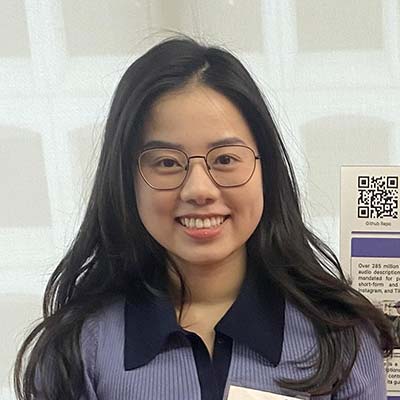
After getting a degree in industrial engineering at the University of Illinois Urbana-Champaign, computer science master's student Lana Do was ready for a change of climate. She moved to San Jose to work in manufacturing, and after being in the Bay Area surrounded by tech, thought she might give computer science a try.
“I really liked the idea of being in the Align program and having people with different backgrounds bring different perspectives,” Do said.
After taking a few machine learning classes and serving as a research assistant for John Alexis Guerra Gómez on his responsible AI project, Do became interested in research. Gomez’s research looked at cases where AI could be harmful for humans, including discrimination.
“[We] published a paper and presented it at a small conference,” Do said. “It was the first time that I had written a paper and then presented it at a conference, so I thought that process was really interesting.”
Now, Do is working on another research project with Ilmi Yoon, one that caters to blind and low-vision users by using AI to create audio descriptions for social media content. Do plans to continue working on this research over the summer and then apply to PhD programs in the fall to pursue more research — not only for the academic aspect, but also to connect with other scholars.
“When I started doing research, I had more opportunities to talk to people about things that they were doing and ask for feedback,” she said, “and I found that experience very fun and rewarding. It has really opened me up.”
Kishore Sampath, Graduate Teaching Award
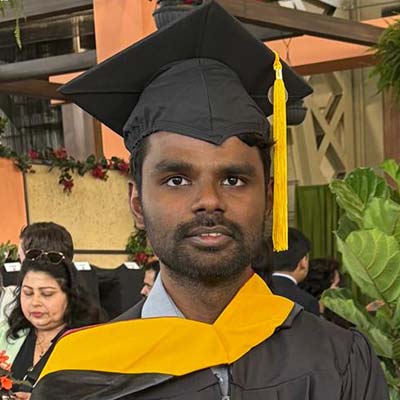
Not every educator enjoys holding office hours, but for Kishore Sampath, a master’s student in artificial intelligence, it was a favorite part of graduate school.
Sampath has worked as a TA for “Foundations of AI” since his second semester at Khoury College, and he attests that the job has enriched his abilities both as a teacher and student. Having earned a bachelor's degree mechanical engineering in India, going back to basics with students in office hours gave him fresh eyes to think through the fundamentals of a new discipline.
“Students would come up with questions that dove deep into the foundational concepts of AI,” he said. “Answering questions like those has also helped me get a good understanding of the basics of machine learning and AI.”
Sampath also created materials for the course. Last semester, for the ethics module, he designed an assignment that asked students to analyze a decision-making model for bias towards certain demographics and taught them how to mitigate this bias. For another assignment, Sampath created a basic model trained on a popular large language model to teach students the concept of knowledge distillation, or the process of consolidating information from a complex model into a simpler one.
When he wasn’t busy being a TA, Sampath worked as a research assistant on various domains of machine learning, ranging from testing the privacy and security of machine learning models trained on bioinformatics data sets to developing bias mitigation algorithms for multimodal models. He intends to carry on his research on AI and machine learning after graduation, but he won’t leave his fondness for office hours behind.
“Even if I work in the industry or somewhere else, I’m planning to give occasional talks to Northeastern graduate students about AI,” he said. “Helping students build those foundational concepts is something I’ll always like.”
Yi Zu, Graduate Community Service Award
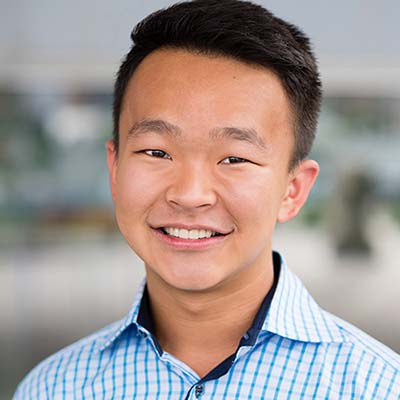
During his undergraduate days studying economics and business administration at Boston University, Yi Zu remembers feeling like his peers in computer science were learning how to do magic.
After working as a data researcher to analyze cryptocurrency trends, Zu’s distant curiosity morphed into a more practical understanding of computer science. He enrolled in an eight-week web development bootcamp to further his programming skills before eventually entering Khoury College’s Align program, a master’s pathway designed for students without undergraduate computing degrees.
As his coursework demystified the “magic” of coding, Zu found ways to leverage his business acumen and emerging technical skills as a Khoury College Graduate Recruitment Ambassador. He presented advice for networking and career advancement strategies at a Khoury graduate student lunch and learn, moderated an academic panel on different computing industry fields, and even helped organize a graduate Halloween party to promote social engagement. In addition to his official responsibilities, Zu made himself available to fellow master’s students by offering advice and mentorship.
“This fall, I stressed the benefits of going to hackathons because of the opportunities to meet people and the projects you can build in 24 or 36 hours,” he said. “I saw a lot of students at Boston University CivicHacks and they recognized me. It was really rewarding to see them follow my advice.”
Being a computer science newcomer also enables Zu to bring a valuable outside perspective to the table, both as an ambassador and a professional. He’s currently seeking software engineering and web development roles and is also interested in founding a tech startup that bridges business and technology. And of course, he’ll be around to advise younger colleagues.
“I push people to network more, because a lot of what I see is students focused on technical skills,” he said. “Nowadays, it’s not enough to be a programmer; you need other communication skills. That’s how my business background comes in handy.”
Neha Makhija, PhD Research Award
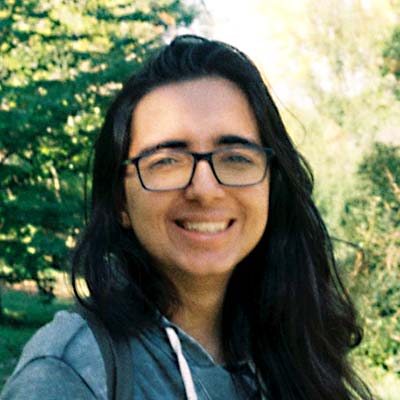
At 15, Neha Makhija learned computer programming to design video games. As an undergraduate, she started a competitive programming club at her school in India. But when it came time to pursue an advanced degree, she decided her long-term interest in computer science was a little less flashy — she wanted to work on problems that lack a clear solution.
Makhija’s PhD research has focused on reverse database management, which involves querying large databases to recognize patterns and identifying which kinds of queries are even possible to answer. With this research, she hopes to expand on the capabilities of traditional structured query language to ask more advanced data questions, using proof-backed algorithms to extrapolate predictive answers.
“You don’t just want to answer queries like ‘What is my current inventory?’ You want to ask questions like ‘Why?’ and ‘How?’ and so on,” she explained. “And you don’t want black box answers, you want actual data that supports your view, and you can prove that it does.”
Although this research is still in its experimental phase, Makhija believes it can be broadly applicable to practically any industry that deals with data, from finding causal patterns in the backgrounds of Grammy-winning artists to examining the resilience of the coffee supply chain. For her, database theory is a way to make sense of both existing and undiscovered human knowledge.
In the fall, Makhija will continue her research as she joins the University of Massachusetts Amherst as an assistant professor.
“I’m really excited to be on the other side of mentoring students and getting them involved in this kind of research,” she said. “I think there are a lot of cool ideas to be discovered and a lot of impact to be made on how we as humans understand our data and get the most information and knowledge out of it.”
Uzma Haque Syeda, PhD Teaching Award
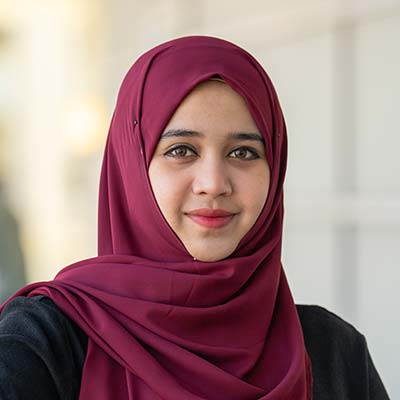
For Uzma Haque Syeda, TAing wasn’t just a side gig she picked up while completing her computer science PhD — it was also an essential aspect of her research.
Since Syeda joined the Khoury Vis Lab in 2018, her research has focused on data visualization and human–computer interaction. In 2020, she published a paper proposing a novel framework for visualization design studies that won “Best Paper” at CHI. She’s also collaborated with several local nonprofits to design data visualization solutions. Much of her work has centered on investigating the ways people conceptualize and interact with visualizations, which meant teaching was a no-brainer.
“I was teaching students how to design effective visualizations for real clients,” Syeda explained. “My research is based on visualization pedagogy, so TAing helped me hone my teaching skills and understand how students approach this type of work.”
It was one of Syeda’s own first-year service-learning projects, in which she created visualizations for a local neighborhood association, that inspired the design framework paper. Since then, she and her advisor, Associate Professor Michelle Borkin, have worked to incorporate more hands-on education into their data visualization class.
Over the course of her PhD journey, during which she gave birth to her first child, Syeda has had to overcome many obstacles. She came in as an outsider to the discipline, having studied electrical engineering as an undergraduate, and she said that the process of writing her dissertation with a demanding five-month-old was the most difficult thing she’d ever done. But she could always measure some of her success by the effusive feedback she’s received from students.
“I was really happy when I saw that students had positive things to say, and a lot of them reached out to me later to say that they were interested in data visualization research,” she said. “It’s really gratifying to know that I’m shaping how people choose to move forward in their careers, and I think that’s my biggest achievement from teaching.”
Lisa Oakley, PhD Community Service Award
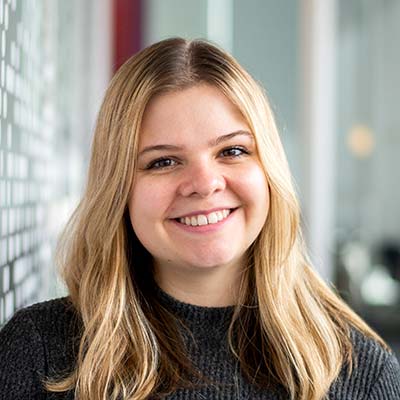
In September of 2020, Lisa Oakley started her PhD in computer science. Although the beginning of a new chapter should’ve been exciting, instead it was lonely and uncertain.
It was difficult to work from home during the pandemic without university equipment and resources. Without an in-person community of colleagues, Oakley felt isolated and unsure if other graduate students and workers were going through the same experience. But realizing that her problems weren’t going to solve themselves, she joined the graduate student worker union, GENU-UAW, and the Khoury College PhD Women’s Group as an organizer.
“I realized I had to connect with student-run organizations and work with other PhD students to create these spaces for ourselves,” she said.
When Oakley joined, the union was struggling with outreach and engagement. But thanks to the efforts of Oakley and her peers in boosting communication and building community power, GENU-UAW was certified in a formal election, and most graduate students have joined, with 1,300 grad student workers signing onto a petition in January calling for a fair contract. Likewise, membership in the PhD Women’s Group faltered in 2020, but the organization now hosts regular lunches consistently attended by 20 to 30 students.
When she graduates this year, Oakley will conclude a 10-year Northeastern journey that included stints as an undergraduate transfer student and a research assistant. During that time, she’s helped shape the growth of two caring communities that supply students with social connection, improved working conditions, support for underrepresented groups in computer science, and better communication with the university.
“This entire experience has propelled me to work really hard to help everyone find their power, find a way to come together and protect each other, and use this contract to set up systems to protect people going forward,” Oakley said. “In any space that I’m in going forward, I think the first thing to me is finding community and making sure that everybody feels safe and protected.”
Meghan Hirsch contributed reporting to this story.
The Khoury Network: Be in the know
Subscribe now to our monthly newsletter for the latest stories and achievements of our students and faculty